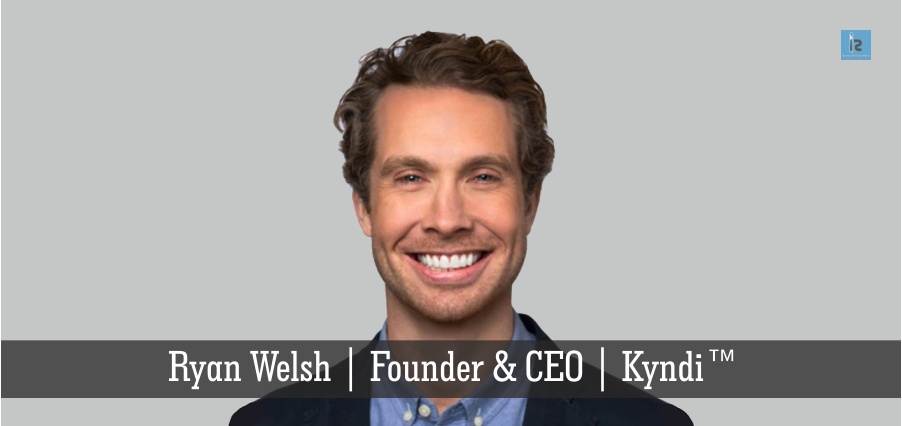In an interview with Insights Success, Ryan Welsh, the Founder and CEO of Kyndi™, shares his experience and gives resourceful insights. In addition to this he has also emphasized on Kyndi™, its products, and motto of the organization along with the future goals in revolutionizing the industry.
Below are the highlights of the interview conducted between Ryan and Insights Success:
Give a brief overview of your background as an entrepreneur.
I got into entrepreneurship in 2012 in business school at the University of Notre Dame. I was going to business school to become a trader in financial services and a good friend of mine was there to become an entrepreneur. He started a few companies during business school, and that’s when I caught the bug. After graduating I worked with an angel investor in the D.C. area, helping him source deals, make investments, and also working on bringing some advanced technologies out of National Laboratories into the Department of Defense and the Intelligence Community. So, for the two or three years prior to founding Kyndi™ in 2014 I was working in and around entrepreneurship.
How do you diversify your organization’s offerings to appeal to the target audience?
For us it’s not about diversifying the product. We have a very general technology similar to a relational database in that everyone is going to use it, so it’s really about who’s going to be the first one to use it. Being super targeted in our go-to-market is key. We target the healthcare sector, specifically the pharmaceutical industry, and the Federal government sector, specifically the military and defense industry.
Describe some of the vital attributes that every entrepreneur should possess.
Grit, humility, and a willingness to learn. If you don’t have those you’re dead in the water.
What were the past experiences, achievements or lessons that have shaped your journey?
I was always fascinated by new things, and entrepreneurship allows me to continually be excited by new opportunities because of the varying stages of the company. I started trading stocks at a really young age and enjoyed making investment decisions or allocating capital for some return, and it always felt like that was being entrepreneurial in some way. I guess what inherently gets me excited is that it’s always new, always fresh, and there is always another new problem you are trying to address. It’s constantly changing.
How do you strategize your game plans to tackle competition in the market?
I’m a voracious reader, so I consume all types of information from all over the place. I would say the harder thing is not the strategy, but for me it’s the operationalizing of that strategy. I consume tons of information, everything from macroeconomic financial news to specific industry insights and competitor white papers. You name it, I consume it and come up with some understanding of what the marketplace is like, then try to navigate that marketplace by coming up with an effective operational plan. I think it really comes down to developing hypotheses about what the likely future will be like, and as the future unfolds you are essentially testing those hypotheses until one becomes the path that is going to unfold. Then you have that plan and are ready to execute on it.
What were the primal challenges and roadblocks you have faced during the initial phase of your career as an entrepreneur?
There’s so much you don’t know, and that is the biggest roadblock. I got out of school with an MBA from a top 20 business school and thought I knew how to run a business. Then you start running a business and get punched in the face, and you realize that you know nothing about running a business. The biggest thing is quickly acquiring the knowledge that you don’t have and turning it into expert knowledge and executing against that.
Where do you see yourself in the near future and what are your future goals?
The future goal would be to turn Kyndi™ into a billion-dollar business and ultimately turn it into a trillion-dollar market cap business. I think with a company like Kyndi™ I have an opportunity to build a sustainable, long lasting business. The upside is so much greater than a lot of potential businesses. You could start a business and sell it for fifty, a hundred, two hundred and fifty million dollars and that’s a phenomenal outcome and you’ve built a great business, but it’s not one that sustains in the long term. Whereas here, I think there is an opportunity to become a great technology company. If I do it right, I’ll be running the company until I retire.
What is your advice for budding and emerging entrepreneurs?
Own your decisions and your own future. Everyone is willing to give advice, and some people provide better advice, some people provide terrible advice, and they are all just data points. Ultimately, you’re the one that makes the decision and you’re the one that knows the most about your company. You have to absorb all of the information and feedback that you get and understand that any decision that you make you should be willing to sign your name to. Listen to everything and understand that they’re all just data points that could be weighted differently depending on who they are coming from and, specifically, that person’s history of success on the task you’re inquiring about. But understand that ultimately the decision is yours and everything that goes right is because of you and everything that goes wrong is because of you.
Source: The 30 Most Influential Entrepreneurs to Watch 2018


